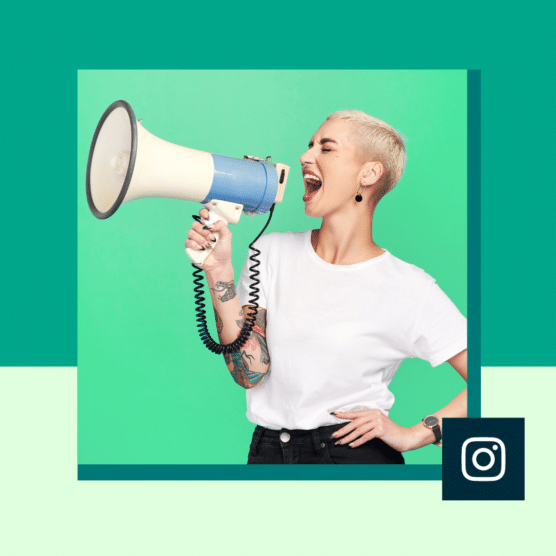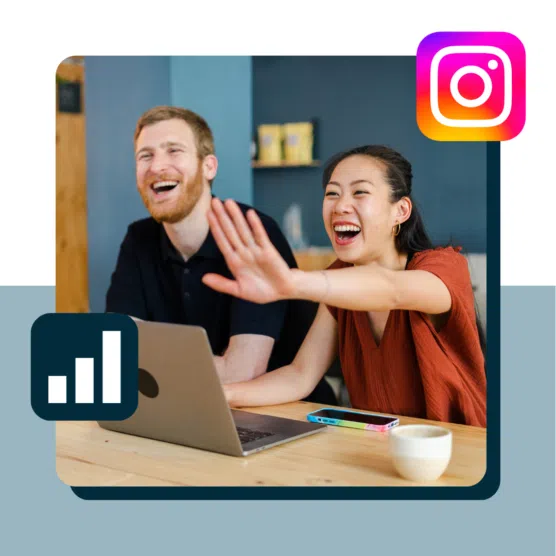Go beyond the obvious Instagram best practices (like posting consistently, engaging your audience, and prioritizing video) with these deep cuts to get the most out of Instagram.
These Instagram best practices are actionable for all types of creators and organizations wanting to make the most of Instagram’s new features.
17 general Instagram best practices for 2025
1. Post 1-2 Stories per day
Our Instagram Stories experiment found posting 1-2 Stories per day received better engagement than posting five or more per day.
Focus on making engaging content, for Stories and elsewhere. Be authentic and growth will follow.

Source: @homesalivepets on Instagram
Not sure what to share? 62% of social marketers are already using social listening to align content with their audience’s interests.
As Natalie Barber, Social Media Specialist at Grand Canyon University, says, “Insights from listening help us look at our scheduled content with a new perspective.”
Check out how Hootsuite’s easy-to-use social listening scans over two billion sources—including websites, podcasts, and more—to power your social growth:
Who this is for: Everyone.
Try this strategy
- Add stickers: Promote engagement by using interactive elements, like links, notification reminders, or the new Reveal and Cutout stickers.
- Use hashtags: Having a few hashtags in your Story increases reach.
2. Use Instagram Story Notes

Source: @wearejrg on Instagram
Story Notes is a new feature where you can post a text note up to 60 characters long to your Stories. This shows up at the top of inbox feeds and on top of your Instagram profile picture. Like Stories, Notes disappear after 24 hours.
Anyone can reply to your Note, which will open a private message conversation and increase engagement. Users can also share your Note in a new post or Reel.
Who this is for: Organizations who want to improve their engagement rate.
Try this strategy
- Ask a question. Reply to everyone for authentic, relationship-building engagement.
3. Make the first 3 seconds count
“Hooking” people in the first few seconds of a Reel increases the likelihood they’ll watch the whole thing.
The Instagram algorithm is driven by watch time. Instagram shows your Reel to a small group it thinks will like it. If it performs well—meaning: watch time, likes, or shares—it’s shown to a wider group. If it continues to perform well, its prominence in the Reels algorithm and Explore page increases for widespread reach.
High-quality content with a solid 3 second “hook” is your best tool for Instagram Reels growth in 2025.
Who this is for: Everyone.
Try this strategy
- Before filming a Reel, know what your hook will be and build the rest of your script around it.
4. Post at the best time
Instead of guessing when your audience is online, rely on hard data with Hootsuite’s best time to publish. Hootsuite identifies when your audience is likely to see your content based on your Instagram analytics (and data from other social networks). Then, auto-schedule content at those prime times with one click.

While your personalized results may be different, our research shows the best time to post on Instagram is 5 AM – 7 AM on Wednesdays.

The best time to post is different by industry. For example, Wednesdays at 4am and Thursdays from 2 AM – 3 AM are the best times for retail brands..

And Wednesdays between 8 AM – 10 AM for the financial services industry, with a bonus hotspot on Fridays at 10 AM.

For a complete overview, read our full research of the best times to post on Instagram by format and industry.
Who this is for: Organizations wanting to maximize reach and engagement.
Try this strategy
- Experiment with posting days and times (or let Hootsuite handle it).
5. Engage, engage, engage
Want the secret hack to doubling your engagement rate? Reply to every comment and message = instant 100% engagement rate boost.
New for this year: Story Notes, as discussed earlier, and broadcast channel comments—reply to those, too.
Meta is working on new ways to make engaging with your audience easier and faster, including conversational AIs in the new Meta AI Studio. (Currently only available to U.S. Instagram accounts.)

Source: Meta
Who this is for: Organizations prioritizing engagement.
Try this strategy
- Juggling multiple inboxes across social platforms? Use Hootsuite Inbox to answer comments and messages across all your profiles together.
6. Collab posts with influencers
Partnering with influencers expands your reach and brand awareness. With Instagram’s new collaborative posts, you can add up to two other partners to a post or Reel. It shows up on the feeds and profiles of all collaborators, boosting the post’s reach for everyone.

Source: Vans on Instagram
Who this is for: Brands of all sizes can find success working with influencers.
Try this strategy
- Ask influencer partners to add you as a collaborator on their Reels.
- New to working with creators? Read our influencer marketing guide, plus find out what you should expect to pay.
7. Tag your location
If you’re a local business, or promoting a local event, tag your location. A location can be a street address or a city. It’s the Instagram equivalent of local SEO.
When people search for or explore a location, your post will show up in the results. As well as your profile, if you have an active Instagram Story tagging a nearby location.

Who this is for: While all users can boost their reach with location tags, brick-and-mortar businesses have the most to gain.
Try this strategy
- Plan regular Instagram Stories and posts tagging your physical location. Grab our free content calendar template to stay organized.
8. Carousels with audio
You can add music to carousels now. Why bother? Because they appear in the Reels tab for more reach. Woo!

Source: @adventurehoundsnc on Instagram
Who this is for: Everyone, but especially brands not currently creating Reels who want to benefit from the Reels algorithm.
Try this strategy
- Add trending audio to your next carousel post.
9. Layer audio in Reels
You can now add up to 20 audio tracks in a Reel. Feature small clips of each audio track to create your own unique “mashup.”

Source: @creators on Instagram
Before now, you could have a voiceover and one music track. Many Instagram creators follow a strategy that sometimes works for TikTok creators: adding a trending audio track and lowering the volume to 5-10%. The voiceover remains the focus but the Reel also gets enhanced reach from the trending audio’s feed.
While this has yet to be formally tested with Instagram Reels, experiment with layering multiple audio tracks in Reels and see if it increases your reach.
Who this is for: Brands comfortable with creating Instagram content around trending audio memes.
Try this strategy
- Trending audio is great, and layering multiple tracks seems even cooler, but make sure it fits your brand. Authentic content always wins.
10. Start a broadcast channel
Now that your audience can comment within them, broadcast channels have grown into a community-building tool. Ensure you’re replying to comments and encouraging participation to build engagement.

Source: @f1 on Instagram
Who this is for: Brands wanting to create a community.
Try this strategy
- Ask questions and use Instagram Polls to gather insightful feedback from your most V.I.P. audience.
11. Comment on creator posts
Brands commenting on popular creators’ Instagram posts is one of the big trends unearthed in our Social Trends 2025 report. Brands who comment on others’ posts receive 60% higher engagement when the creator replies.
Our research found 41% of brands are already experimenting with proactive engagement strategies. The key is commenting on the right type of posts to attract your ideal audience.
For example, online banking app EQ targets Canadians. Commenting on Canadian-themed memes like this make sense for the brand (and earned them a lot of engagement).

Source: @oh.canaduh on Instagram
Who this is for: Brands whose main goal is audience growth.
Try this strategy
- Use social listening tools to find posts to comment on. Spend 20 minutes per day leaving 5-10 (strategic!) comments and check metrics after 30 days to see how it’s impacting growth.
12. Use the Notify sticker in Stories
Launching something time-sensitive or want to boost traffic for an upcoming sale? Tease it in Instagram Stories with the Notify sticker. Followers who tap it will receive an in-app notification at the event time.

Who this is for: Promote any time-limited event.
Try this strategy
- In a Reel or Instagram post caption, direct users to sign up for the notification in your Stories.
13. Lean into video trends
Who this is for: Brands with a humorous or cheeky side.
Try this strategy
- Part of knowing what’s trending is to spend time watching Reels (or TikToks). Tell your boss we said it’s okay, it’s for work!
14. Use Instagram pinned posts
Pinning a post or Reel to the top of your feed means people see it first when they visit your Instagram page. You can pin up to three top posts. Use it for a FAQ or guidelines post or as a space to learn more about you.

Source: @threeshipsbeauty on Instagram
Who this is for: All organizations can use pinned Instagram posts to further their social media goals.
Try this strategy
- Use a pinned post as a suggestion box and encourage comments and feedback.
15. Get Meta verified
While getting Instagram verified won’t make or break your reach in the algorithm by itself, it does have two key benefits for brands:
- It protects your name and lets Instagram users know you’re the real deal.
- It can kinda sorta increase your reach…
As photographer Eric Thurber points out, comments from verified accounts appear at the top, making it more likely users will click to view your profile.

Source: r/InstagramMarketing on Reddit
Who this is for: Brands wishing to protect their identity and inspire trust.
Try this strategy
- Pair this strategy with commenting on popular creators’ posts for maximum effect.
16. Save time repurposing with AI
Sure, you can manually repurpose your top posts, but AI can do it in one click.
OwlyWriter AI, built into Hootsuite, saves time by grabbing your top posts. Click one and bam, a new version is ready for you to edit or schedule—all right inside your Hootsuite dashboard.

Who this is for: People who like saving time.
Try this strategy
- See everything OwlyWriter AI can automate for you, then try it out yourself with a free trial of Hootsuite.
17. Put hashtags in the first comment
We experimented and found having hashtags in the first comment increased engagement by 60%.
Better news? You can now schedule that first comment in advance with Hootsuite.

Who this is for: Everyone.
Try this strategy
- Keep it to 3 to 5 hashtags.
4 Instagram advertising best practices for 2025
Many of the Instagram best practices above also apply to ads, but here are a few specific strategies for ads.
1. Reminder ads
Like the Notify Stories sticker, Reminder ads let viewers opt-in to receiving in-app notifications at a specific time.

Source: @peakdesign on Instagram
Who this is for: Brands launching a promotion or other upcoming event.
Try this strategy
- Run a Reminder ad with Meta’s automated Advantage+ targeting.
- Support your Instagram marketing campaign with Reminders in organic posts.
2. Autoboost ads with Hootsuite
Not only can you manage all your organic and paid social content together in one place with Hootsuite, but you can also set up autoboosting for Instagram ads.
Set automatic triggers to boost a post when it hits a certain number of engagements or views, contains a keyword, and more. Choose to autoboost only Reels, Stories, or Instagram feed posts — or all three.

Who this is for: Brands wanting to intelligently automate their Instagram ads strategy.
Try this strategy
- Try a campaign to autoboost all posts with the keyword “sale,” or those with over 1,000 views, or a specific hashtag to promote user-generated content ads.
3. Use Checkout on Instagram
Instagram users can shop your products and pay right inside the app. Currently, Checkout on Instagram is only available to U.S. businesses.

Source: Instagram
Who this is for: U.S.-based ecommerce businesses.
Try this strategy
- If you’re eligible, compare conversion results of in-app checkout vs. your website.
4. Experiment often!
Last tip? Throw out all advice and run your own experiments. Let your analytics tools and social listening data uncover ways to test your current social media marketing strategy.
But Trish Riswick, Social Team Lead at Hootsuite, advises keeping your content strategy in mind, even when experimenting with new formats, ads, or topics:
“When creating, it helps to remember which [content] pillar the piece of content you’re making belongs to. This ensures that everything from the first draft to the final post aligns with the goals of that pillar.”
– Trish Riswick, Social Team Lead at Hootsuite

Source: How to create a social media calendar: Our team’s POV
Who this is for: Experimentation is a vital part of every Instagram marketing strategy.
Try this strategy
- Use social listening to discover a question your target audience has. Answer it in multiple formats (e.g. carousel, Reel, etc). Test the performance of each.
Wanna save 11 hours per month? Hootsuite offers best-in-class scheduling, social listening, and AI tools combined with a universal inbox and smart engagement features—for all your social media platforms. Try Hootsuite free today.







